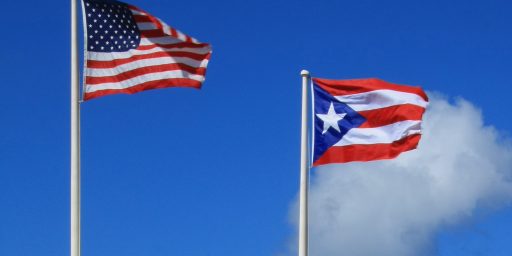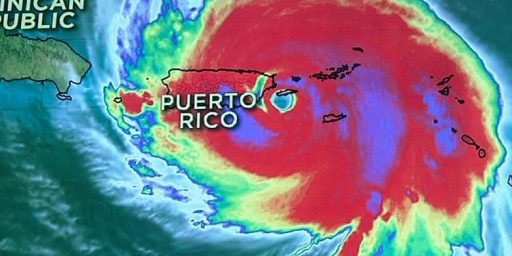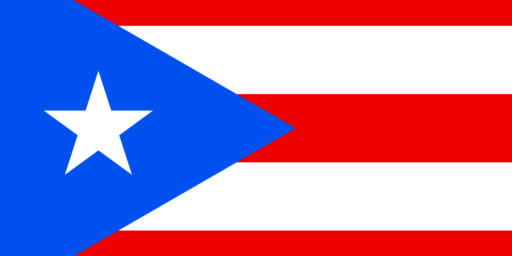Puerto Rico Votes in Favor of Statehood
Via the Houston Chronicle: Puerto Rico votes on US ties and chooses governor
The two-part referendum first asked voters if they wanted to change Puerto Rico’s 114-year relationship with the United States. A second question gave voters three alternatives if they wanted a change: become a U.S. state, gain independence, or have a "sovereign free association," a designation that would give more autonomy for the territory of 4 million people.
With 243 of 1,643 precincts reporting late Tuesday, 75,188 voters, or 53 percent, said they did not want to continue under the current political status. Forty-seven percent, or 67,304 voters, supported the status quo.
On the second question, 65 percent favored statehood, followed by 31 percent for sovereign free association and 4 percent for independence.
[…]
Puerto Rico held non-binding referendums in 1967, 1993 and 1998, with statehood never garnering a clear majority and independence never obtaining more than 5 percent of the vote.
Now, what this actually means remains to be seen, but it does seem to suggest an important in Puerto Rican sentiment.
I must confess that I find the notion of citizens who lack key political rights (such as representation in the national legislature*) to be a bit odd, so see statehood as a good idea.
I have long thought, however, that statehood for PR as highly unlikely, because Republicans would likely see PR as a new Democratic state. However, the GOP clearly needs to find a way to cultivate Hispanic votes, and this might be a way. Beyond using it as a way to cultivate votes, the Republicans might have to worry about how opposition to PR statehood would play with other Hispanics already in existing states.
It would be interesting to watch for a variety of reasons.
h/t: Chris Lawrence’s FB page.
*That makes me think of something of significance in US history. Hmm, what was it?




The Tea Party will surely champion representation for all Puerto Ricans
@PT: Without a doubt!
This is brilliant. The GOP will fight the idea of another blue state, thus pissing off Hispanics even more. Ah hah hah hah!
Perhaps oddly, the RNC platform officially favors Puerto Rico statehood if they ask for it; the DNC platform does not mention it. Of course, platforms don’t mean all that much, but people were making a big deal of it.
More importantly, statehood did not get as big a majority as that implies, and really did not get a majority. About 400,000 ballots were left blank. Why? Because the three options were: “statehood,” “independence,” or “enhanced free association sovereignty,” with the last meaning something like what they have currently but with somewhat more autonomy. Many people who preferred the exact status quo and didn’t like any of the three options left it blank. Some people who voted “no” on status quo on the first option still voted for “enhanced free association sovereignty.”
You can see this by noting that 1.4 million voted on the first question, but only 1 million voted on the second question, with 400,000 left blank
The Yes-No question had 1,447,860 votes, 779,352 No and 668,508 Yes for “are you satisfied with the current status?”
The “What Option Do You Prefer” question had only 1,090,716 votes, 674,474 for Statehood, 358,642 for “Estado Libre Asociado Sobrerano,” and 57,600 for Independence, with 400,090 blank and 15,000 spoiled and protest ballots.
So I’d say it’s actually a bit more inconclusive.
Technically then what would be required for Puerto Rico to become a state? Not that I think Republicans would allow it.
That makes me think of something of significance in US history. Hmm, what was it?
This is an extremely funny remark and also deeply patriotic.
When I think of harbors I often think of Phil Ochs’ songs.
I would welcome Puerto Rico statehood for cultural reasons but also on principle. “If you’re not in the room, the conversation is about you. If you’re in the room, the conversation is with you.”
What a dumb reason to be against PR statehood….
No, there is a bigger problem here. Both Guadeloupe and Reunion, two overseas territories that are in fact part of France, faces problems with high cost of living and with a overvalued currency for their economy, since they don´t print their money and the money that they use is issued considering a much larger economy in another continent.
It´s not so different from what happens in Hawaii and Alaska, two states that have high cost of living, by the way. Puerto Rico would have to be able to print it´s own money to be economically viable. As it is now, it needs subsidies from Washington DC to exist.
It is probably reminding you of the Tea Party Patriots successful attempt to enfranchise the citizens of Washington, DC with a voting Congressmember.
Hee!
@John Thacker:
The best theory I can come up with is that García Padilla managed to mobilize a number of people outside his party (the PPD created the Commonwealth status) to vote for him but they in turn skipped the status question, while all of Fortuño’s PNP voters supported statehood on the ballot, as his party does.
@Fausta: But they voted for the first part of the status question, just not the second part. The first question favored change by 54%-46%, but some voters wanting change want enhanced autonomy while remaining a Commonwealth not statehood. However, many Commonwealth supporters did not vote on the second part because they don’t want to support an effort to seek extra autonomous powers.
@Fausta: Also, what are the odds that some traditional PNP voters who support statehood voted for Garcia-Padilla on economics, since Fortuno was quite conservative economically? They could still vote for statehood in the referendum.
@John Thacker:
it’s puzzling, for sure.
Or, to be facetious, it reminds me of Saint Augustine’s (the saint, not the city in FL) saying, “Grant me chastity and continence, but not yet”.
That’s a BIG LIE. These are the facts:
Independence: 72,551 votes
Sovereign Commonwealth (ELA Soberano) : 436,997 votes
Ballots not marked : 468,478
Protested ballots (something written on them) : 17,602
Total ballots = 1,797,807
Percentage of the vote for statehood in relation to total ballots = 802,179 / 1,797,807 = 44.6%
LESS THAN 50% OF VOTERS ENDORSED STATEHOOD!
http://www.blogger.com/blogger.g?blogID=792887629786289008#editor/target=post;postID=6136350442290736078
Just to remind you, the current “first lady” of Puerto Rico was scheduled to speak at the Republican Convention. I believe that she ended up introducing Ann Romney.
@Fausta:
The blank votes do not count, they were left blank because they favored them status quo (US Territory) and even there 54% of the people are against it. The Cotes that count are the ones that made their choices known, since we would not know how thye would have voted or if it was a simple mistake and did not mark statehood, you cannot assume to know how they wanted to vote.
N santana you convoluted Popular Democratic Party math does not add up in the real world, since the votes that were left black were most likely the status quo and even that was beat you do not get to add them up and claim they are against statehood, since the vote is private all you are doing is assuming thats what it meant.